In this article:
How to conjugate Russian nouns by cases
Many learners of the Russian language struggle with Russian nouns conjugations, that is, Russian cases. Suddenly, the same word you used to know or just learned from a dictionary changes its ending and looks totally different in the text? And then how are you supposed to know which ending to use and which case is good for your phrase?
Modern English has largely lost its inflected case system (although personal pronouns still have three cases, e.g. I-me-mine), while many languages of the world have extensive case systems, with nouns, pronouns, and adjectives all inflecting (usually by means of different endings or suffixes) to indicate their case.
Types of Russian cases
There are 6 cases in Russian:
Nominative case in Russian (именительный)
It is the simplest case in the Russian language, as words do not conjugate – they have the same form and endings as in the dictionary, this is the initial form.
In Nominative, a noun is the subject of the sentence.
Вот (here is), это (this is) are followed by nouns in Nom.Case.
Вот мой паспорт. – Here is my passport.
Это моя мама. – This is my mom.
Nominative is also used after ‘am’, ‘are’, ‘is’ :
Я – американец. – I am an American.
Genitive case in Russian (родительный)
Genitive case answers the questions кого? чего? and may be used as with prepositions, as without.
In most dictionaries, nouns are given with the Genitive case ending alongside the gender, for example:
ЗДА́НИЕ, -я, ср. Строение, архитектурное сооружение, постройка (обычно больших размеров). Новое здание. Высотное здание. (Малый академический словарь, МАС)
where –я is the ending of this word in genitive, ср. – is the abbreviation of neuter gender.
Genitive is used in phrases like “у меня нет…” (I have not got …), in the phrases denoting the quantity of something, e.g: ложка мёда (a spoon of honey), and many other situations.
Dative case in Russian (дательный)
The primary usage of this case is to express the act of giving something to someone, the action directed onto/towards someone/something.
Accusative case in Russian (винительный)
In a Russian sentence, the direct object of a transitive verb goes into the accusative case. So, if the noun is the subject – it is put in Nominative, if it is the direct object of a verb – it is put in Accusative.
Think of it in this way:
when you just want to describe something, name it, speak about it – this is the main thing in the sentence (Это – журнал) = use nominative.
If the action is directed towards something, if the object is acted upon (Он читает журнал) = then use Accusative.
In this example Он читает журнал (He reads a magazine), журнал is the object of the verb читать (to read). There is no difference between the Nom. and Acc. singular forms of журнал in terms of endings, but they are put in different cases.
Instrumental case in Russian (творительный)
Instrumental case is used to describe a joint action (action done with someone / with the help of something).
Prepositional case in Russian (предложный)
As the name suggests, it can be used only with prepositions. If your native language still uses case system, most probably it would be called «Locative».
Prepositional case is used when we answer the question Где? (Where?), В чём? (in / at what object?) to describe that something is in/inside/on/at – with prepositions В or НА, and also to denote the object of speech, thought, dream, dispute – always with the preposition O.
Related: Russian Prepositions В and НА – A Complete Guide
It is beyond the scope of this article to discuss all the usage cases.
Here are just the basics for your reference.
We highly recommend you to join our E-MAIL COURSE ON RUSSIAN CASES to learn this topic in detail.
See the table for the questions each of them answers to, these questions will help you decide on the endings to use in nouns.
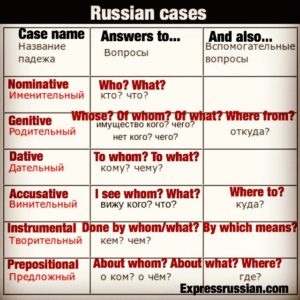
Russian cases & conjugation of Russian nouns
The conjugation of nouns by cases is called declension.
Declension is the variation of the form of a noun, pronoun, or adjective, by which its grammatical case, number, and gender are identified.
In Russian, there are 3 declension types of nouns.
In the table below, you will find information about cases and possible inflections of Russian nouns.
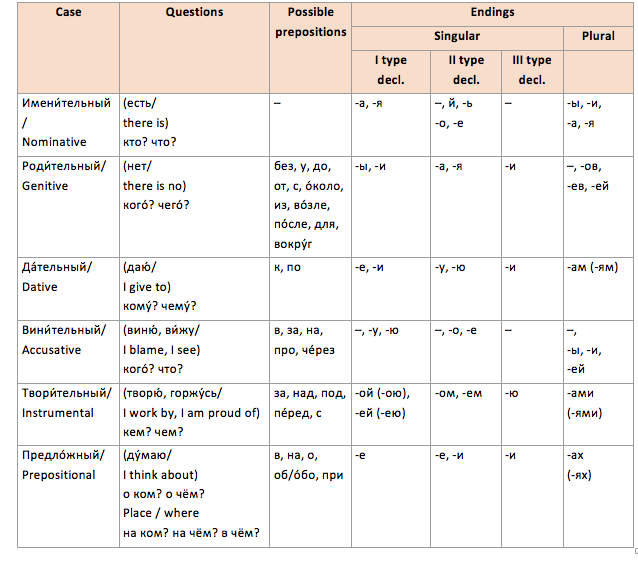
Nouns declension types
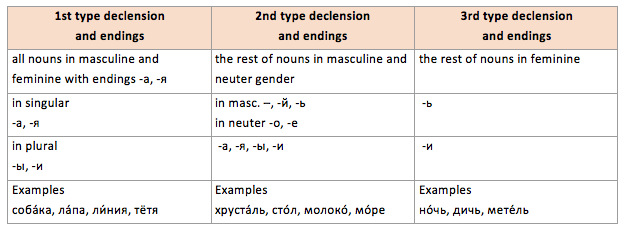
Declension of I type: examples of conjugation

Declension of II type: examples of conjugation
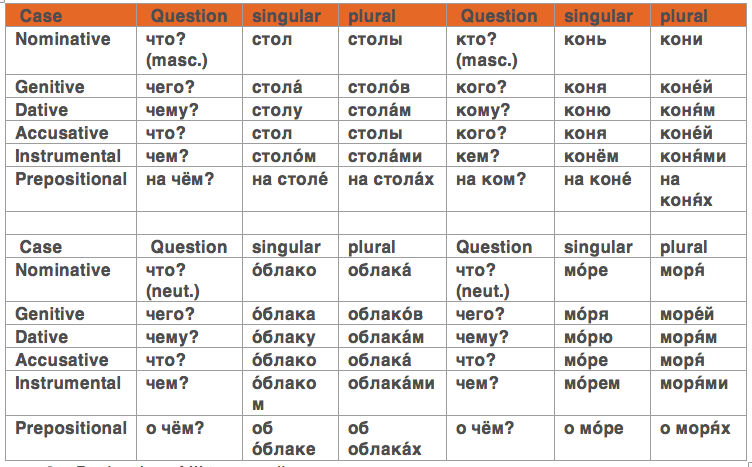
Declension of III type: examples of conjugation

Mind the difference!
Nouns of III type declension in feminine that end by ж, ш, ч, щ in singular Nominative have ending -ь, while nouns of II declension in masculine do not have -ь in the end:

In Russian, some nouns keep 1 form in all cases and numbers. Therefore, they are called indeclinable nouns. Almost all of them were borrowed from other languages, e.g. пальто, метро.
Join our E-MAIL COURSE ON RUSSIAN CASES to master Russian cases like a pro!
Russian Cases and Prepositions
Genitive case prepositions
из, с (from, out of) : из офиса (out of office)
без (without) : без молока (without milk)
вдоль (alongside) : вдоль реки (along the river)
вместо (instead of) : вместо меня (instead of me)
вне (outside of) : вне дома (outside of home)
внутри (inside) : внутри дома (inside home)
далеко от (far from) : далеко от дома (far from home)
для (for) : для работы (for work)
до (before) : до обеда (before lunch)
кроме (besides) : крoме нас (besides us)
напротив (opposite) : напрoтив здaния (opposite the building)
около (near to) : около реки (near the river)
от (from) : от друга (from a friend)
ради (for the sake of) : ради успеха (for the sake of success)
после (after) : после школы (after school)
среди, посреди (in the middle of) : посреди поля (in the middle of the field)
сзади (behind) : сзaди меня (behind me)
у (at, nearby) : у библиотеки (by the library)
у (at, at the house of) : у Марины (at Marina’s place)
у (at possession of) : у Марины есть дочь (Marina has a daughter)
Accusative case prepositions
Prepositions в, на can be used with accusative (with the meaning of direction, moving towards) and prepositional case (with the meaning of location).
Read our extensive article about prepositions в and на
в (to, into, meaning direction): в парк (to the park)
на (on to, meaning direction): идти на работу (to go to work)
про (about) : про Ирину (about Irina)
за (for, in support of) : за мир (for peace)
через (through/across, in a moment): через дорогу (across the road), через неделю (in one week)
Prepositional case prepositions
в (in, meaning of location) : в парке (in the park)
на (at, meaning of location): на концерте (at the concert)
о, об, обо (about) : об Ирине (about Irina)
Instrumental case prepositions
с (together with) : Я играю в шахматы с другом (I play chess with my friend)
над (above) : над столом (above the table)
под (under) : под домoм (under the house)
перед (in front of) : перед зеркалом (in front of the mirror)
за (behind) : за дверью (behind the door)
рядом с (next to) : рядом со школой (near the school)
между (in between) : между деревьями (in between trees)
Dative case prepositions
к (to, towards, meaning of direction): Мы подошли к реке (We came up to the river)
по (alongside, round and round) : Я каждый день хожу по этой улице (I walk along this street each day)
Russian Cases Exercises
In the parenthesis, write the auxiliary question and define the case.
Example: Писать (в чём? – Prep.) в дневнике (чем? – Instr.) карандашом.
Ехать (_____________) по дороге (________________) на машине.
Идти (_______________) к дому (________________) Ольги.
Забить (_______________) гвоздь (_______________) молотком.
Приготовить (_______________) суп (_______________) из грибов.
Работать (_______________) врачом (_______________) в больнице.
Пойти (_______________) после школы (_______________) к бабушке.
Играть (_______________) в игру (_______________) за компьютером.
Читать (_____________) книгу (_____________) после обеда.
Купить (_____________) билет (_____________) на концерт.
Узнать (_____________) новость (_____________) от друзей.
Убирать (_____________) лопатой (_____________) снег.
Навестить (_____________) друга (_____________) в больнице.
Выйти (_____________) из дома (_____________) без шапки.
Join our E-MAIL COURSE ON RUSSIAN CASES to master Russian cases like a pro!
Convenient online format with all the rules usage rules explained and plenty of examples. Optional homework.
1 lesson a week for 6 weeks.
Choose between self-study (e-book with all the materials) and tutor-supported study.
RELATED POSTS:
LEARN RUSSIAN WITH OUR SELF-STUDY MATERIALS
FUTURE TENSE IN RUSSIAN GRAMMAR
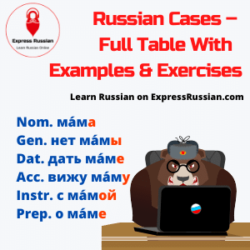

17 replies on “Russian Cases – Complete Table with Endings & Examples”
я бразилец я изучать русский язык самостоятельно большое спасибо! привет из бразилии!!!
ОДНОЙ ИЗ САМЫХ ИНТЕРЕСНЫХ ЯЗЫКАХ ДЛЯ МЕНЯ ЯВЛЯЕТСЯ РУССКИЙ ЯЗЫК.
Thus, to understand Russian speech and speak Russian correctly, it is necessary to learn how to use cases in Russian.
I feel this is one of the most significant information for me.
And i am satisfied reading your article. But want to commentary
on few basic issues, The website taste is perfect,
the articles is in reality nice : D. Good activity,
cheers
Thanks for your feedback! Indeed, “Russian Cases” is the most significant topic in Russian language, you can not move further until you figure out this. What other issues are you experiencing?
Hi there i am kavin, its my first occasion to commenting anywhere,
when i read this post i thought i could also
create comment due to this brilliant article.
Keep on working, great job!
I’m excited to find this website. I need to to thank you for ones time for
this fantastic read!! I definitely enjoyed every little bit of it
and I have you saved as a favorite to see new
information on your website.
Good day! I could have sworn I’ve been to this site before but after
browsing through some of the post I realized it’s new to
me. Nonetheless, I’m definitely happy I found it
and I’ll be bookmarking and checking back often!
I am glad you are enjoying reading our articles and progressing with your Russian!
Spot on with this write-up, I truly feel this site needs much more attention. I’ll probably be returning to read more,
thanks for the info!
Very nice article, exactly what I wanted to find.
[…] Russian language has 6 cases, 3 genders (Masculine, Feminine, Neuter) and 2 numbers (Singular and Plural). The same word (be it […]
This is very interesting, You’re a very skilled blogger. I’ve joined your rss feed and look forward to seeking more of your great post. Also, I have shared your web site in my social networks!
[…] Related: Russian Cases […]
I appreciate the time and effort you put into this, but that Russian font is killing me!
Why does the “т” look like “m”????
I think that font is too confusing and/or distracting for some beginners…like myself.. Most of the letters aren’t too confusing, like “п” is “n”, “и” is “u”, etc. And even “д” looks like “d”…. but everytime I’m pronouncing the “т” as “m”. That one makes no sense to me!! 😫
Hello! I think you are speaking about Russian cursive (the handwritten font). Well, it’s true that it is different from the computer-typed Russian font, but the good news is – it’s not widely used, if you travel or read online you will only come across computer-typed letters. Also, once you learn how the letters (typed and cursive) look like, you will not get confused.
This table on the Russian alphabet will guide you: /russian-alphabet/
You will find printed letters alongside handwritten cursive letters.